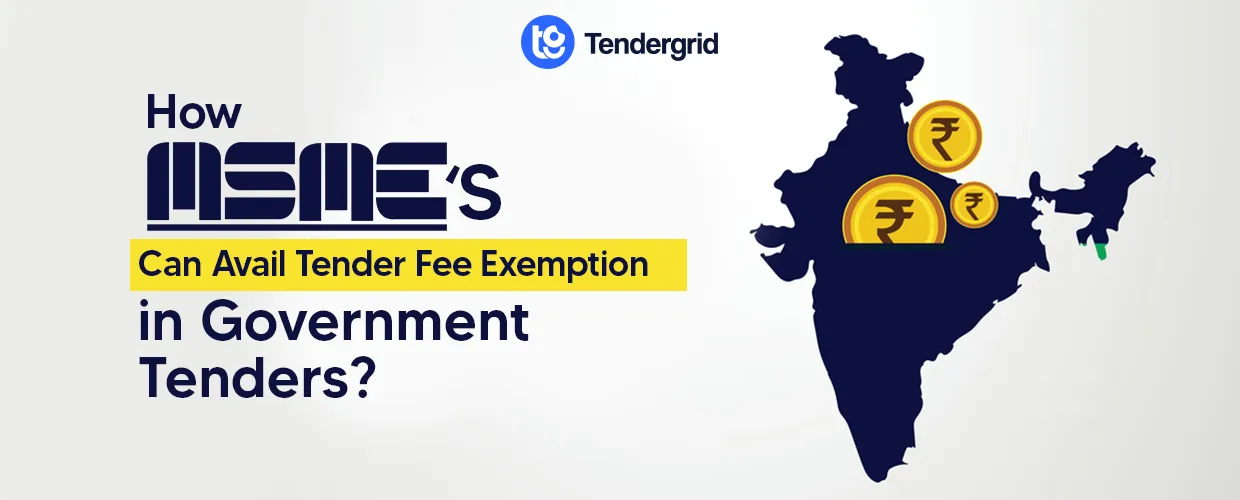"The journey of a thousand miles begins with a single step." — Lao Tzu
For Micro, Small, and Medium Enterprises (MSMEs), the path of growing their business can often feel like a long journey; it is full of challenges and obstacles. One such hurdle is the process of dealing with government tenders, which can appear to be intricate and expensive. This is why the government has introduced a number of initiatives that can help relieve the burden for MSMEs, one of which is tender fee exemption.
So, here on this Tender Grid blog, you will get an idea of what tender fee exemption is, how MSMEs can benefit from it, how we can help MSMEs to increase their opportunities in government tenders, and so on. So, if you are an MSME owner interested in growing your business through government procurement, keep reading this blog till the end.
What is Tender Fee Exemption?
A tender fee is the cost associated with submitting a bid for a government contract. This fee is usually charged when an organisation shows interest in any government project, and it is a part of the cost of being involved in the procurement process. However, for most of the MSMEs, this can be an obstacle, particularly when they have limited financial resources.
This is the reason to level the playing field; the government provides tender fee exemptions for MSMEs. These waivers eliminate the cost burden of tender payment, enabling small businesses to bid more easily and secure government contracts.
To level the playing field, the government offers tender fee exemptions for MSMEs. These exemptions remove the financial burden of paying for tenders, making it easier for smaller enterprises to compete in the bidding process and win government contracts. This initiative allows MSMEs to concentrate more on showing their capabilities and solutions instead of being worried about the upfront costs.
Government Initiatives Supporting MSMEs in Tenders
The Indian government has announced several initiatives to encourage MSMEs by facilitating their access to government tenders. One of the main initiatives is the Public Procurement Policy for MSEs, which requires that 25% of the total annual procurement of goods and services by the central government be procured from MSMEs. It is a big step towards fostering inclusivity and empowering small businesses to expand.
Moreover, the Udyog Aadhaar Memorandum (UAM) is another crucial tool for MSMEs. Basically, the UAM is an online registration process that allows MSMEs to officially register their business. After registration, they are eligible to take part in all the government schemes, including tender fee exemptions. helps MSMEs officially register their business. Apart from this, MSMEs can enjoy other advantages such as easier access to loans, subsidies, and preferential treatment in government tenders.
Both central and state governments have also simplified and made the procurement process more transparent by introducing online portals such as GeM (Government e-Marketplace) and the Central Public Procurement Portal (CPPP). These portals allow MSMEs to search, bid, and win tenders without the bureaucratic red tape that tends to delay small businesses.
Eligibility Criteria for Exemption of Tender Fee
Not all MSMEs are eligible for a tender fee exemption. To take advantage of this benefit, companies need to fulfil certain criteria. The following is a list of the eligibility criteria:
1. MSME Registration:
The first step is to have your business registered as an MSME under the Udyog Aadhaar or MSME Development Act. The registration acts as proof that your business is of a size and turnover to qualify as micro, small, or medium.
2. Size and Turnover Limits:
Government departments can have different levels, but the general rules are as follows:
- Micro Enterprises: Plant and machinery investment should not be more than ₹1 crore, with an annual turnover limit of ₹5 crore.
- Small Enterprises: Plant and machinery investment should not be more than ₹10 crore, with an annual turnover limit of ₹50 crore.
- Medium Enterprises: Plant and machinery investment should not be more than ₹50 crore with a limit of ₹250 crore on annual turnover.
3. Registration on Relevant Portals:
MSMEs should also be registered on government procurement portals such as GeM (Government e-Marketplace) and CPPP (Central Public Procurement Portal). These portals give access to tenders, which often come with fee exemptions for qualifying businesses.
4. Tender-Specific Exemptions:
It is necessary to mention that not all MSMEs tenders offer fee exemptions. This is why you should always read the tender document thoroughly to ensure if the fee exemption is available. But some sectors or specific types of tenders may not offer this advantage.
How to Apply for Tender Fee Exemption?
Once an MSME meets the eligibility criteria, applying for a tender fee exemption is an easy task. Here's a step-by-step guide that will help MSMEs to navigate the process:
Step 1: Ensure MSME Registration
Ensure your business is registered as an MSME with Udyog Aadhaar or another concerned authority. This registration is necessary for availing government schemes, such as tender fee exemptions.
Step 2: Choose Appropriate Tenders
Look for MSMEs tenders that clearly provide fee exemptions. Tender Grid enables you to filter and identify opportunities specific to your business. Be sure to read eligibility information carefully so you meet the criteria.
Step 3: Submit Tender Application
When you find relevant MSMEs tenders that suits your business, submit your application via the online portal. Your MSME registration details (for example, your Udyog Aadhaar number) will probably be required of you to seek the exemption in most instances. Make sure you also submit all other required documents, including your technical bids, financial bids, and any other related tender documents.
Step 4: Confirm Exemption
While submitting your bid, double-check that the tender document explicitly mentions the fee exemption for MSMEs. If it doesn’t, reach out to the issuing authority to confirm whether the exemption applies in your case.
Step 5: Track Your Application
After submission, use the same portal to track the status of your application. Stay proactive by following up with the relevant authorities if needed and keeping an eye on updates.
Know the Common Mistakes MSMEs Make When Availing Tender Fee Exemptions
Although the process is meant to be straightforward, most MSMEs commit errors that can prevent them from this precious advantage. The following are some common errors to avoid:
1. Not Registering with Udyog Aadhaar: One of the primary reasons MSMEs lose tender fee exemptions is that they are not registered with the concerned authorities. Make sure you complete your Udyog Aadhaar registration well in advance.
2. Not Checking Tender-Specific Requirements: Not all tenders are exempt from fees, and others may have more specific requirements. Always carefully read the tender notice to confirm whether the exemption holds for your firm.
3. Missing Tender Deadlines: Tender applications usually have deadlines and if you are unable to meet these deadlines will result in disqualification. Utilise tools such as Tender Grid to keep up with timelines and get timely reminders.
4. Incomplete Documentation: Unable to submit all required documents—such as financial statements or your MSME registration certificate—can invalidate your bid. Double-check your application before submission to ensure everything is in order.
The Benefits of Availing Tender Fee Exemption for MSMEs
Availing of tender fee exemptions has a number of advantages for MSMEs:
1. Cost Savings:
By removing tender fees, MSMEs save money that they can invest elsewhere in their business, for instance, in operations, marketing, or recruitment.
2. Increased Participation:
Exemption of fees allows MSMEs to bid on more tenders without worrying about upfront costs, thereby raising the possibility of winning contracts.
3. Increased Competitiveness:
Reducing the entry barrier level of the playing field between small businesses and large companies, promoting healthy competition.
4. Growth Opportunities:
Securing government contracts can lead to higher revenue, better reputation, and sustained business growth.
How Tender Grid Maximises MSMEs' Tendering Opportunities?
We know how tough it is for MSMEs to go through the tendering process. Which is why we've developed a platform that helps online tendering be simple and easy for them.
Using Tender Grid, MSMEs are able to:
-
Access a curated list of government tenders that offer fee exemptions for MSMEs.
-
Get timely alerts on new tender opportunities.
-
Shortlist tenders by eligibility, industry, and geography to identify those most appropriate for your business.
-
Keep track of your applications, watch out for deadlines, and never miss a valuable opportunity.
Let Tender Grid be your trusted partner in your tendering process. We do the hard work so you can concentrate on what is most important to develop your business and take it to new heights.
Conclusion
The path to success for MSMEs can be full of challenges, but with the proper knowledge and tools, success is well within reach. With knowledge of how to access tender fee exemptions, MSMEs can lower the cost of doing business and raise their chances of securing high-paying government contracts. And here Tender Grid can help you to make this happen by offering the means and assistance wherever necessary so you can find all the relevant documents with ease. Therefore, don’t let tender fees hold you back; just start exploring your options today and take the first step toward expanding your business horizons.
Explore More Blogs:
1. New Year Government Tender Opportunities: Key Sectors to Focus On
2. A Comprehensive Guide to Win GeM Tenders in 2025

